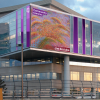For Boston teenagers Asiyah and Ibraahim Herrera, who have been homeschooled from the start, the family “Saturday Night Special” was a highlight of the week.
“Everyone else might have been watching The Incredibles, but we were watching NOVA,” recalls Asiyah. “We’ve been watching NOVA and PBS ever since we were little kids,” she says. “It was a huge part of our upbringing.”
Asiyah and Ibraahim are among a cadre of Boston students who came to WGBH Studios to celebrate the completion of the new NOVA Science Studio program, designed to open up the world of science journalism to students typically underrepresented in science fields.
“NOVA, a flagship program for over 45 years, feels a duty and obligation to foster curiosity and creativity in the next generation,” says Tenijah Hamilton, who manages the program. “NOVA editors and producers have skills that they want to pass on."
More than half of the NOVA staff contributed to the six-month pilot program, which included a new curriculum and independent media projects. Three Boston area sites participated: John D. O’Bryant School of Mathematics and Science, Somerville High School, and 826 Boston, a youth writing organization. NOVA Science Studio was developed by Ralph Bouquet, Director of Education and Outreach for NOVA, who was inspired by PBS NewsHour’s Student Reporting Labs.
NOVA staff offered guidance and support to students as they interviewed and filmed scientists, physicians, and mental health practitioners, producing videos and articles on such topics as “Biomarkers Help Identify the Right Treatment of Children with Autism,” “Is Artificial Intelligence a Threat to Our Working Class?” and “Social Media and Depression.”
Asiyah, 17, and Ibraahim, 15, were students at the 826 Boston site and worked together on a multimedia project about the dangers of vaping for teens.
“I love to write,” says Asiyah, “but I’d never written about science. I’d never done a science news article.”
Her mother, Ashanta Ambush, nods. “The program stretched her to write in a completely different way,” she says, recalling that her daughter’s first draft sounded more like a research paper. NOVA advisors helped her to find examples of journalistic science articles and to rework her story.
Among the guests at the closing ceremony was Ambika Kapur, Program Officer within the education program of Carnegie Corporation of New York, funder of the NOVA Science Studio pilot, and of NOVA’s 2016 documentary on the science of learning, School of the Future.
The six-month NOVA Science Studio pilot will be refined and expanded, with hopes of national scope, said Pamela Rosenstein, project director at NOVA.
Education is a family affair for the Herrera family. No less than 17 family members, including grandparents, cousins, aunts and uncles, showed up to celebrate the siblings’ accomplishments.
Learn more about the Nova Science Studio here.




